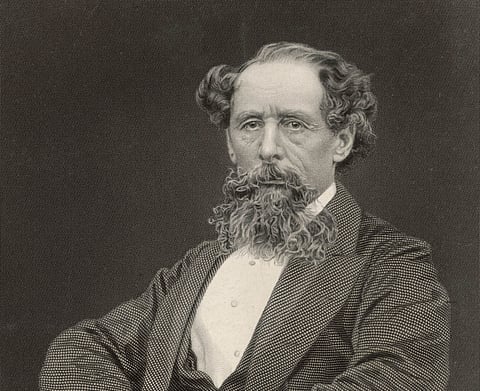For the love of Charles Dickens
He takes us through the streets of London, nudging us to look into a dark Victorian workhouse or pointing us to the vulnerable segments of the society

That dank dream again…I saw her house, of old bricks, the many iron bars looked fearsome as I saw it when lightning flashed for a nanosecond! The walled up windows and some of them were rusty with neglect and hurt.
There was the courtyard again. Somebody whisked me through the main door, the corridors were dark.
Then there I was in the fine lady’s dressing room, cob-webbed and forlorn. I saw the corpse-like bride, old and shrunk. And I awaken, sweating profusely. “Ma, I almost met Miss Havisham again!” I cry out to my mother, my voice quivering with streams of Dickensian ecstasy. But I was only nine and this madness disturbed my mother.
I blame it all on that little girl called Matilda, the reader of books and BFG-the Big Friendly Giant, who initiated me into the world of Dahls Chicken, oops, I beg your pardon, Charles Dickens.
Matilda, who taught herself to read at the age of three, by perusing through the newspapers lying around the house was clearly my ideal!
At four, this dark haired girl was totally absorbed in the marvellous world of Pip and Miss Havisham and thus Dickens cast his spell of magic not only on Matilda but on me too. With her I read Great Expectations.
A book, which I wasn’t allowed to take from the school library, I was presumably underage. But I did borrow BFG by Dahl….and the Big Friendly Giant boomed at me loud and clear from the book —“I is reading it hundreds of times, and I is still reading it and teaching new words to myself and how to write them. It is the most scrumdiddlyumptious story.’
He was reading Nicholas Nickleby by Dickens. I quietly went to my mother’s book shelf and began the voracious rampage-and I found it. Thus began my foray into the world of Charles Dickens.
Grade six brought into my life A Tale of Two Cities and it was a year of living the lives of Lucie Manette, Sydney Carton and Charles Darnay.
The English teacher, Miss Fernandes, curly-haired and hedgehog-like, brought Madame Defarge’s ruthlessness to life. We looked forward to our English lessons as sometimes the class would turn into the formidable Bastille, to create horror Ms Fernandes would bring in her knitting and skilfully go about her act of enacting the cold and impassive Madame Defarge, as she read to us with a raised eyebrow and a sly smile of relish!
The ‘knitting’ symbolised the start of the French Revolution as she knits the list of names of those who were to go to the guillotine.
The characters are so well grooved into our being that they will forever be a part of us! The novel finds relevance even today as Dickens had wisely written, “It was the best of times, it was the worst of times, it was the age of wisdom, it was the age of foolishness, it was the epoch of belief, it was the epoch of incredulity, it was the season of Light, it was the season of Darkness, it was the spring of hope, it was the winter of despair, we had everything before us, we had nothing before us…”
During my years in the boarding, I would try my best to somehow wriggle into the skin of the characters I would read about.
Oliver Twist as he begged for some more gruel, “Please Sir, I want some more.” saddened me as I grew a bond of parental love for him. It is said that Dickens tried to keep to a strict routine of writing in the morning without disturbance.
But one day at his Doughty Street residence, hearing the sound of laughter and playing in the living room, Dickens left his study and joined his family, bringing with him his portable writing desk, ink pot, quill and paper.
There he went on to write Oliver Twist, telling the family not to worry about him but rather to go on with their play.
Affectionate narrator
A meticulous stickler for keeping the house absolutely proper, he had the last say about how the decor of his house should be set up. When he was travelling in Italy he wrote home to his wife, “Keep things in their places. I can’t bear to picture them otherwise.” Hence, it might sound bizarre but every year on his birthday — February 7, I make sure I visit Ikea or Home Centre and pamper myself… Valentine’s Day is anyways a week away to drive home the motive for this indulgence further!!
A brilliant wordsmith and an affectionate narrator, he holds our hands while walking us through the streets of London, nudging us to look into a dark Victorian workhouse or pointing us to the vulnerable segments of the English society.
Dickens’ favourite novel was David Copperfield, based on his own life, as he moves from an impoverished childhood to become a successful author.
He wrote, “Whether I shall turn out to be the hero of my own life, or whether that station will be held by anybody else, these pages must show.” Well, that station will always have one hero, Mr Dickens. And that is - you!
Navanita Varadpande is a writer based in Dubai.


